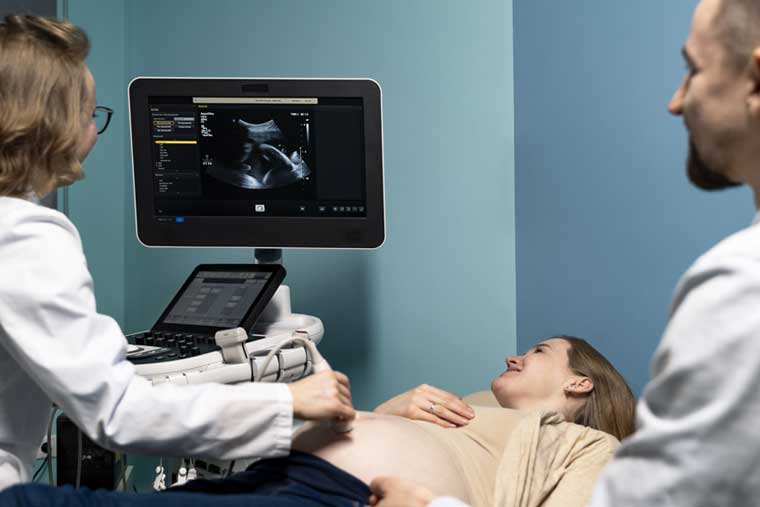Welcoming a new life into the world is a moment of pure bliss, uniting parents, relatives, and friends in celebration. If it’s twins, the happiness doubles. Once we find about the twin pregnancy, we should think of the necessary care for the pregnant woman and her twins. The effort and care should be doubled for a healthy childbirth. The pregnancy risk depends on the mother’s overall health, diet, lifestyle and medical history.

TWIN PREGNANCY CARE: KEY FACTORS TO KEEP IN MIND
During a twin pregnancy, ensuring proper nutrition and calorie intake becomes even more crucial than in a single fetus pregnancy. Both the mother and babies require significantly higher levels of calories and protein for healthy development. Given the inherently higher risks and complications associated with twin pregnancies, frequent visits to the doctor are strongly recommended. These regular check-ups serve to assess and address potential risks and complications proactively, enabling timely decisions on necessary treatments or medications.
ESSENTIAL SCANS IN MULTIPLE PREGNANCIES
As per the doctor’s advice, we can perform as many as scans to ensure the safety of mother and babies. Here are few important scans that will help the parents to take necessary precautions and decisions.
Early Pregnancy Scan
An Early Pregnancy Scan, also known as Viability Scan or Dating Scan, is done at 6-10 weeks of pregnancy. Based on the scan report, we can confirm the pregnancy, number of fetuses, placentas, amniotic sacs and determines the gestational age. This scan helps to find out what type of twins you have and establish a more accurate due date for twins. This initial scan will also check whether the baby is growing in the right place.
Chorionicity Scan
The Chorionicity Scan is conducted alongside your dating scan and NT Scan. Its purpose is to determine if your twins share a placenta or have individual ones. If they share a single placenta, closer monitoring is essential due to higher chances of complications. This knowledge aids your doctor in providing vigilant care for your babies, especially if they require additional attention due to complications.
Nuchal Translucency Scan (NT Scan)
NT Scan is performed typically between 11 & 13 weeks +6 days of pregnancy. This scan evaluates the Nuchal Translucency, which measures the fluid buildup behind each baby’s neck. An abnormal thickness in this measurement can signal a higher risk of chromosomal abnormalities, including Down syndrome.
Anomaly Scan
An Anomaly Scan or Anatomy Scan is done around the 18th – 22nd week of pregnancy to measure the baby and check its internal organs; brain, heart, spine, bowel and limb structures for any abnormalities. It also determines the function of the placenta, amount of amniotic fluid and the blood flow through umbilical cord.
Growth scans
A twin pregnancy growth scan is a specialist pregnancy ultrasound scan which is performed from mid-trimester to measure the size and development of both twins. It is performed at regular intervals to examine each baby’s well-being and detect any growth discrepancies or potential concerns. By constantly monitoring the growth and health of each individual fetus, the scan plays an essential role in optimizing care and outcome for twin pregnancies.

Doppler Ultrasound:
Doppler Ultrasound Scanning in multiple embryos pregnancy is a valuable diagnostic tool that assesses blood flow in the umbilical cords and placenta of both fetuses. This non-invasive procedure helps healthcare providers to monitor circulation and detect potential complications, such as abnormal blood flow or growth restriction.
Biophysical Profile (BPP): BPP is often performed in the third trimester, usually after 28 weeks. It evaluates each baby’s movements, breathing, muscle tone, and the amount of amniotic fluid. The BPP assesses their overall well-being.
Non-Stress Test (NST): NST is a common test done in the third trimester to assess each baby’s heart rate and responses to their movements. It helps determine if the babies are receiving enough oxygen and if there are any signs of distress.
Multiple Marker Test (Quadruple Screen): This blood test, typically performed between 15 to 20 weeks, screens for the risk of certain chromosomal abnormalities and neural tube defects in both babies.
3D/4D Scan: This optional scan provides three-dimensional or four-dimensional images of the babies, offering a more detailed and real-time view of their features and movements. It’s usually done for bonding and non-medical purposes.
Since its inception in 1996, Ambady Scan Centre has consistently invested in the latest technology within the field. We offer various Ultrasound Scans, Doppler Scans, NT Scans, and all kinds of pregnancy scans, ensuring comprehensive and reliable results. With over 25 years of experience and cutting-edge technology, Ambady Scan Centre guarantees the most reliable and accurate results, prioritizing the health of both the mother and baby equally.



